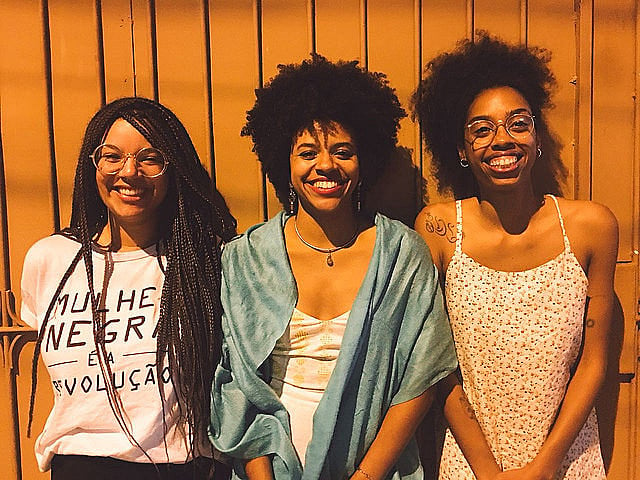Brazil’s film industry is relatively new compared to other countries, especially in Europe. That alone greatly impacts how stories are made and told through audio and video. In 2017, only 3,425 films were registered with the Certificate of Brazilian Product, according to the Brazilian Cinema and Audiovisual Observatory. The certificate is like a “birth certificate” proving that a movie was made in Brazil and who owns it. And what’s noteworthy about this is that 2,448 of these films are independent.
But when it comes to black people in this business, the numbers are even worse. According to data from a survey conducted by researchers of the Federal University of Rio de Janeiro and published by Nexo newspaper, “black and mixed-race people are half the population in Brazil, but only 15 percent of lead actors and 2 percent of directors of Brazilian films.”
In Recife, northeastern Brazil, a group of black women is working on a project that can contribute to change this.
The documentary Hixikanwe – Estamos Juntas ("Hixikanwe – We’re Together") was born out of director Debora Britto’s personal experience, as she embraced her identity as a black woman. She moved to Mozambique, in Africa, in 2014, where she started to understand her ancestrality and see through the pain and what it means to be a black woman in a sexist, racist society.
Her movie aims to capture that essence, as Débora, Safira, Mayara, Mariana, Gabriela, and Magda – Brazilian women – encounter Judite, Júlia, Amélia, Madalena, Graça, Ramia, from Mozambique.
“Over these last four years, I have been trying to understand the processes black women in general go through. Speaking with other women, we realized we feel very similar things. We may have different stories and come from different places, but where we come from, we share this feeling. That’s when we become aware of what it means to be a black woman,” Débora says.
It’s not a coincidence that Hixikanwe means "we’re together" in Xitsonga, the language spoken in southern Mozambique. It was at a social organization with that same name in that same area where it all started in 2014, and also where they will resume the shooting for the film in 2018.
Mariana Reis, the executive producer of Hixikanwe, says that, even though there are public policies dedicated to supporting Brazil’s film industry, it’s still hard to make movies in the country. Their project is a recipient of Funcultura, a culture grant offered by the Pernambuco state government, but in order to receive it, they had to make cuts to their original budget.
“Making films in Brazil is very expensive, and even more expensive when we think about black cinema, made by black women, which is the weakest link in this chain. But we believe in it and we keep doing our thing and working hard, creating a network of possibilities to make this project happen,” she says.
The crew is planning to go back to Mozambique in early August and they are doing a crowdfunding campaign to help finance their film. Anyone can help. Just visit their page at Benfeitoria (in Portuguese), a Brazilian crowdfunding site, and choose a funding option starting at R$15 – less than US$4.
Not only will you be supporting the movie, but also have the chance to choose a reward, like having your name included as a thank-you in the final credits, getting a T-shirt, a mug with exclusive artwork, or Mozambican accessories. The deadline to participate is July 16th.
It’s an all-or-nothing campaign, so if they don’t achieve the R$25,000 goal (about US$6,400), all the money will return to those who donated it.




